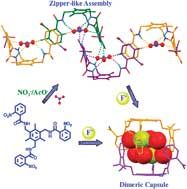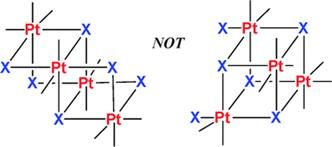Removing fluoride from drinking water
Advertisement
Excess fluoride in drinking water can have severe implications for human health, with effects ranging from dental and skeletal fluorosis, to the potentially fatal osteosarcoma (cancer of the bones).

Encapsulation of a fluoride-water cluster by an arene based tripodal receptor
Pradyut Ghosh and colleague, from the Indian Association for the Cultivation of Science in Kolkata, have developed a tripodal receptor based on a 1,3,5-methyl substituted benzene ring with nitro substituted aryl terminals, which can effectively encapsulate fluoride anions in solution. This bowl-shaped molecule is electron deficient, and upon exposure to electron rich fluoride anions, forms a dimeric capsule which sequesters the potentially dangerous fluoride anions away from the bulk of the solvent medium.
This technology could also be used to isolate reactive intermediates, which could help towards the understanding of reaction mechanisms, although the potential application of the method for the removal of fluoride anions from drinking water shows great promise.
Original publication: M. Arunachalam and Pradyut Ghosh, Chem. Commun., 2009.
Other news from the department science

Get the chemical industry in your inbox
By submitting this form you agree that LUMITOS AG will send you the newsletter(s) selected above by email. Your data will not be passed on to third parties. Your data will be stored and processed in accordance with our data protection regulations. LUMITOS may contact you by email for the purpose of advertising or market and opinion surveys. You can revoke your consent at any time without giving reasons to LUMITOS AG, Ernst-Augustin-Str. 2, 12489 Berlin, Germany or by e-mail at revoke@lumitos.com with effect for the future. In addition, each email contains a link to unsubscribe from the corresponding newsletter.
Most read news
More news from our other portals
Last viewed contents
Melexis
Geothermal_exchange_heat_pump
Trimethylsilyl_azide
Benzoyl
Rodeo_San_Francisco_Refinery
Propionaldehyde
Wave Motion - New Compounds for Molecule Interferometry Experiments
Azide_alkyne_Huisgen_cycloaddition
Peter_Dervan
Category:Cadmium























































